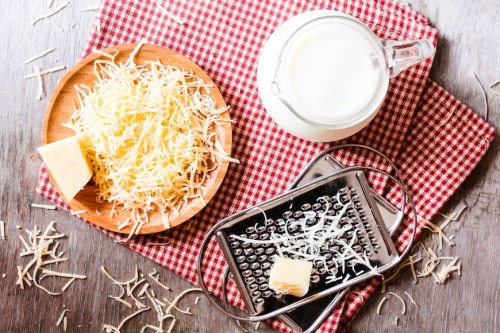There are some foods that virtually every doctor and dietitian deem unhealthy (ahem, French fries). But other foods fall into more of a gray area, like rice, soy, and, most importantly, cheese. Is it possible to live your healthiest life ever without cutting ties with it?
Well, don’t loosen the grip on your beloved hunk of cheddar just yet. “Cheese can absolutely fit into a healthy diet,” says registered dietitian Desiree Nielsen, RD. But not all cheeses are created equal when it comes to their nutritional value, she says. Keep reading to find out the 6 healthiest cheeses you can eat, plus tips on how to know if a cheese is truly good for you.
Scroll down for three tips on determining if a cheese is nutritious or not, and see the top healthiest ones.

1. Consider the ingredients
Just like with every other food at the supermarket, ingredient quality matters. “You want to look for a cheese made from pure milk,” Nielsen says. And that’s not necessarily a no-brainer: A lot of processed cheeses contain not-so great ingredients like artificial food colorings, saturated vegetable oils, sorbic acid (a preservative) and extra salt. As a general rule, Nielsen says the ingredients list should be as simple and clean as possible.
If it’s available to you and your budget allows, Nielsen recommends choosing grass-fed, hormone- and antibiotic-free cheeses. “This should be on the label as cheese suppliers know it’s something consumers are looking for,” she says. “Another way to tell is in the ingredients list; it will usually say ‘hormone-free milk.'”
As for cow vs. goat vs. sheep cheeses…Nielsen says one isn’t exactly “healthier” than the others, but there is some scientific evidence showing that sheep and goat cheese can be easier to digest if you have a lactose sensitivity. “Some people who are lactose intolerant are sensitive to the A1 protein type that occurs in cow’s milk,” she says, which doesn’t occur in sheep or goat milk.
2. Choose a flavorful cheese
Nielsen’s second big tip for choosing a healthy cheese is to go for one with a lot of flavor. “When you choose something like goat cheese, feta, or Parmigiano Reggiano, you get that flavorful hit, so you end up using a lot less of it,” she says. “Having a little cheese is healthy because of the vitamin D, calcium, and protein,” she says. But add a cup of it to every meal, she adds, and the saturated fat content will start to outweigh those benefits.
That said, Nielsen says it’s still best to go for a full-fat cheese over a low-fat cheese because it will be more satiating and you’ll end up eating less. “My advice is to go for full-fat and full-flavor, and simply use less,” she says.
Nielsen also points out that not all the fat in cheese is bad. It also contains unsaturated fat, which plays an important role in the body. “In addition to carrying flavor, fat also helps you absorb fat soluble nutrients,” she says. “Many vital chemicals in different vegetables and other plant foods are actually fat soluble nutrients, so we need some fat in our meals and cheese can play that role for us.”
3. Pick something a little older
The last major factor Nielsen says to pay attention to is the fermentation process. “The longer it’s fermented, the more the lactose is broken down and the casein is broken down by the microbes,” she says. This means it will be easier to digest, and there will contain more good bacteria. “The fermentation process also increases the B vitamins in cheese,” she says. Plus, Nielsen says a one-year old cheese, for example, is a lot more flavorful than one that isn’t aged (so you’re getting two birds with one stone). Pro tip: Look for the term “Aged” on the label to know you’re getting something, well, a bit older.

The top healthiest cheeses
Okay, so now you’re armed with some tips for choosing the most nutrient-dense cheese. But which ones make Nielsen’s short list of the best ones to add to your diet? Here, she reveals her top picks:
For everyday use: cottage and ricotta cheeses
“Cottage cheese and ricotta cheese are both good everyday cheeses because of their high protein content,” she says. A half-cup of cottage cheese has about 12 grams of protein, while a half-cup of ricotta clocks in at 9 grams. “These two cheeses in particular are protein-forward, as opposed to fat-forward,” she says.
Cottage cheese is particularly to eat for breakfast with fruit and a drizzle of honey. Ricotta also pairs well with fruit and honey, but you can also add it to any veggie-based dish to give it a creamier, richer texture.
To add flavor to a dish: cheddar, Parmigiano Reggiano, goat cheese, and pecorino
If you’re looking for a cheese to add some punch to your dinner, Nielsen says these cheeses are all great because it doesn’t take a very big serving to add a lot of flavor. “All of these cheeses are also high in calcium,” she says. Other benefits you’ll get: protein and unsaturated fat.
All four of these cheeses pair particularly well with vegetable-based dishes, from zucchini noodles and baked dishes to on top of salads.
You definitely don’t have to kiss all your favorite cheesy dishes goodbye to live your healthiest life ever. The key is to go for quality and full-flavor. And the best part is, it will taste better that way, too!
Vegan cheese can also have a place in a healthy diet. And this cheese grating hack will seriously transform the way you cook.
Sign Up for Our Daily Newsletter
Get all the latest in wellness, trends, food, fitness, beauty, and more delivered right to your inbox.
Got it, you've been added to our email list.











